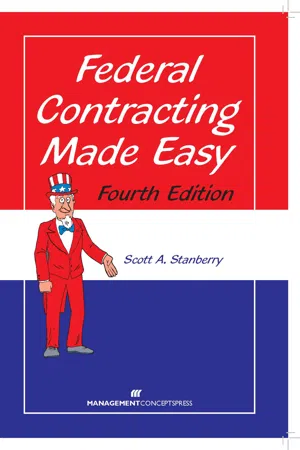
- 346 pages
- English
- ePUB (mobile friendly)
- Available on iOS & Android
Federal Contracting Made Easy
About this book
Federal contracting... easy? With the fourth edition of Federal Contracting Made Easy, it is!
Whether or not you consider federal contracting easy, it is certainly easier with this guide. Used successfully by thousands of contractors and feds, this book offers practical, hands-on, no-nonsense advice.
Now in its fourth edition, Federal Contracting Made Easy lays out the entire federal contracting process in a readable and easy-to-understand style. This book covers how government procurement works, what you can do to cut though the red tape to speed your way to winning a contract, who the key players are, and tips for overcoming obstacles.
New in this edition:
• Discussion of government-wide acquisition contracts (GWACs)
• Updates on women-owned small business
• New status of service-disabled veteran-owned small business
• Expanded list of relevant websites and resources
• Introduction to the new System for Award Management (SAM)
Whether you are about to enter the competitive world of federal contracting or have been bidding for contracts for years and are now looking for updated information and ideas, this is the book you need.
The federal government awards billions of dollars in contracts for goods and services every year. This book will help you win a piece of that business.
Tools to learn more effectively

Saving Books

Keyword Search

Annotating Text

Listen to it instead
Information

What Is Federal Government Contracting?

happiness is wanting what you get.
How Does Federal Government Contracting Work? |  |






THE BIG PICTURE

| Government Contracting | Commercial Contracting |
| General | |
| Federal policy establishes formal competition criteria for purchases or procurements. | Company determines competition criteria. |
| Congress appropriates available funds. | Many sources provide funds. |
| Laws, direct... | |
Table of contents
- Cover
- Title Page
- Copyright
- About the Author
- Author’s Note
- Contents at a Glance
- Contents
- Preface
- PART I: WHAT IS FEDERAL GOVERNMENT CONTRACTING?
- PART II: HOW YOUR BUSINESS SIZE OFFERS OPPORTUNITY
- PART III: HOW TO FIND GOVERNMENT CONTRACTING OPPORTUNITIES
- PART IV: HOW THE GOVERNMENT ISSUES PROCUREMENT OPPORTUNITIES
- PART V: CONTRACT TYPES AND ADMINISTRATIVE REQUIREMENTS
- Appendix A: Acronyms
- Appendix B: Federal Agencies and Departments
- Appendix C: Glossary
- Index
Frequently asked questions
- Essential is ideal for learners and professionals who enjoy exploring a wide range of subjects. Access the Essential Library with 800,000+ trusted titles and best-sellers across business, personal growth, and the humanities. Includes unlimited reading time and Standard Read Aloud voice.
- Complete: Perfect for advanced learners and researchers needing full, unrestricted access. Unlock 1.4M+ books across hundreds of subjects, including academic and specialized titles. The Complete Plan also includes advanced features like Premium Read Aloud and Research Assistant.
Please note we cannot support devices running on iOS 13 and Android 7 or earlier. Learn more about using the app